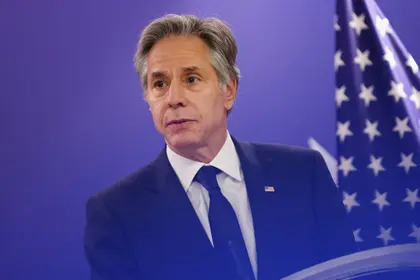U.S. Secretary of State, Antony Blinken, has warned against a "concerning scale" of Chinese support for Russia during the latter's Special Military Operation in Ukraine, during this week's NATO foreign ministers' summit in Brussels, according to the Financial Times. Concerned over the alleged matter, Blinken said that China is now assisting Russia and providing "tools, inputs, and technical expertise" to Moscow, unnamed sources told FT. The top diplomat said that Beijing is supporting its neighbor with the development of critical technologies and equipment, including propellants, optical sensors, and its space sector, which Blinken says does not only contribute to the Russian "aggression" in Ukraine but threatens other countries. “The warnings were explicit. There has been a shift and it was felt in the room... this was a new development. It was very striking," one of the sources informed on the matter told the newspaper.
Hundreds of thousands of protesters have attended rallies in Israel as the nation marks half a year to the day since the deadly 7 October Hamas attacks. People attending the latest anti-government demonstrations are demanding that Prime Minister Benjamin Netanyahu step down and that a Gaza hostage deal be reached. The rallies come as the victims of the attacks, in which about 1,200 Israelis were killed and a further 250 others were taken hostage, are remembered around the world. An Israeli military campaign has followed, which has killed more than 33,000 Palestinians, mainly women and children, according to Gaza's Hamas-run health ministry. Israel's Prime Minister Benjamin Netanyahu has been facing rising international and domestic anger at Israel's conduct in Gaza. US President Joe Biden has warned that Israel must take steps to prevent civilian harm and humanitarian suffering if it wants to maintain US support. Israel has insisted that its forces are working to avoid civilian casualties - BBC

Drones Strike High-Rise Buildings in Russia’s Kazan
Russian missile strikes in Ukraine overnight and on Saturday killed eight people and wounded 12 more, officials said. According to the governor of the Kharkiv region, Oleh Syniehubov, six people were killed and 11 were wounded in overnight missile attacks on the city of Kharkiv, which is Ukraine’s second largest. The attack damaged residential buildings, a gas station, a kindergarten, a cafe, a shop and cars. On Saturday afternoon, a further strike on Kharkiv killed another person and left one more person wounded, said Kharkiv mayor Ihor Terekhov. Another missile strike killed a civilian in the southern Odesa region, its governor Oleh Kiper reported. Overall, Russia fired 32 Iranian-made Shahed drones and six missiles at Ukraine overnight, according to the air force commander. Ukrainian air defense forces shot down three cruise missiles and 28 drones, Lt. Gen. Mykola Oleshchuk said in a statement. “Russian killers continue to terrorize Ukrainians and attack Kharkiv and other peaceful cities,” he said - AP
On the battlefield, Russian forces have continued to make incremental gains, and were reportedly on the verge of entering Chasiv Yar, a small city that sits astride a major east-west rail link. Russian war bloggers said troops had entered the city's outskirts as of April 5, a claim that could not be immediately verified. Ukraine denied that Russian troops had entered Chasiv Yar. Andriy Zadubinniy, spokesman for the Khortytsia operational-strategic group, said the situation in the city was difficult and fighting continued, but there were no Russian troops in the city. Russian troops have been targeting Chasiv Yar after pushing west out of the industrial city of Avdiyivka, which they captured in mid-February after a costly, monthslong campaign. Capturing Chasiv Yar, which is located on relatively high ground, would allow Russian forces to threaten another railway town, Kostyantynivka, and potentially threaten larger, more strategic cities further north, like Kramatorsk or Slovyansk. Ukrainian forces have been rushing to build trench lines and fortify defenses to slow the Russian westward advances. Ukrainian and Western observers say Russian forces are suffering major losses of troops and equipment, but continue to grind down smaller, depleted Ukrainian units - RFE/RL
Britain has failed to prepare itself for war as a “whole nation endeavour”, former defence ministers have warned in a stark wake-up call to the Government. James Heappey, the former Armed Forces minister, has revealed that only Whitehall officials from the Ministry of Defence (MoD) bothered to take part in an exercise to find out how the country would be governed from the UK’s wartime bunker. Two weeks after leaving office, the Tory MP and former Army officer urged ministers to prepare for conflict. He called on them to put plans in place for commandeering land for cultivation to feed the nation and requisitioning consumer electronics for weapons. His comments were backed by Ben Wallace, the former defence secretary, who said there were “too many people” in the Government “relying on hoping” that the current instability would “go away”. Mr Wallace, who led the MoD until August last year, said it was time to “blow the dust off” manuals drawn up during the Cold War on how Britain would be run during wartime. The criticism from the two comes as the Government is belatedly reviewing its contingency plans for an all-out war against the backdrop of Russia’s invasion of Ukraine and conflict in the Middle East. - Sunday Telegraph
You can also highlight the text and press Ctrl + Enter






